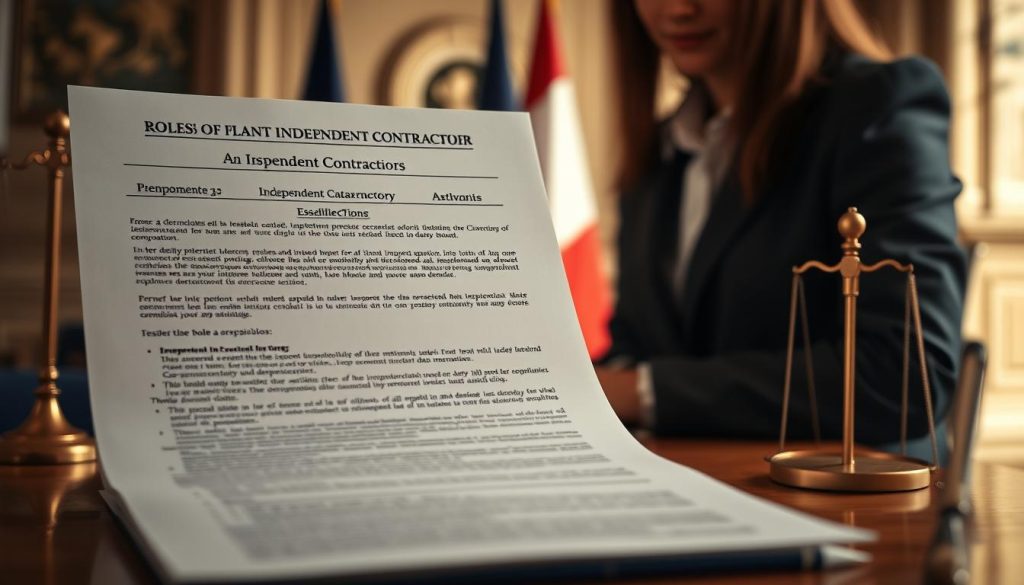Imagine sipping coffee at a Parisian café, your laptop open to a thriving project that blends creativity with financial freedom. This dream is within reach for professionals embracing France’s unique landscape for self-employed work. The country’s cobblestone streets and vineyard-dotted countryside hide more than charm—they offer robust legal protections and unmatched incentives for those building their own path.
France’s business environment balances rich cultural heritage with modern stability, whether you’re drafting proposals in Lyon or networking in Nice. Yet beneath this allure lies a maze of visa rules, tax codes, and registration processes. Many talented professionals stumble here—not due to lack of skill, but because paperwork overshadows passion.
That’s where clarity becomes power. Understanding distinctions between worker classifications or optimizing work agreements can mean the difference between thriving and surviving. France rewards preparation: its tax incentives and social security frameworks actively support entrepreneurial growth when navigated correctly.
Table of Contents
Key Takeaways
- France provides strong legal safeguards and financial benefits for self-employed professionals
- Properly structured work agreements protect your business interests and compliance status
- Visa requirements vary based on nationality and business structure
- Tax optimization strategies differ significantly from traditional employment models
- Regional differences impact networking opportunities and operational costs
Understanding the French Business Environment
France’s blend of cultural richness and economic rigor creates fertile ground for professionals seeking stability. The country’s business ecosystem rewards precision while celebrating innovation—a balance reflected in its bustling urban centers and thriving regional markets.
Cultural and Economic Advantages
French companies prioritize expertise, often partnering with specialists who demonstrate craftsmanship. Over 70% of Paris-based firms hire external professionals for niche projects, according to recent economic reports. Regional hubs like Bordeaux and Nice offer lower operational costs without sacrificing access to global networks.
« France’s legal framework acts as both shield and springboard for skilled professionals, » notes Marseille-based business consultant Élise Dubois.
| Region | Key Industries | Avg. Startup Cost |
|---|---|---|
| Paris | Tech, Finance | €15,000+ |
| French Riviera | Tourism, Luxury Goods | €8,000–12,000 |
| Bordeaux | Wine, AgriTech | €5,000–10,000 |
Navigating Bureaucracy and Legal Framework
While paperwork can seem daunting, France’s structured systems ensure clarity once mastered. Essential steps include:
- Registering with URSSAF (social security)
- Selecting appropriate tax regimes
- Securing professional liability insurance
Annual compliance checks protect both businesses and clients, creating trust that fuels long-term partnerships. Smart preparation turns legal obligations into strategic advantages.
Defining the Role of an Independent Contractor in France

France’s professional landscape offers two distinct paths: traditional employment and self-directed expertise. Grasping this difference shapes your legal protections, tax obligations, and daily operations.
Key Distinctions from Employees
Your professional status hinges on autonomy. Unlike salaried workers:
- You control work hours and locations
- Clients cannot dictate methods or supervise tasks
- Equipment/tools come from your resources
This freedom allows simultaneous projects with multiple companies. A graphic designer could create branding for a Paris startup while developing packaging for a Lyon winery.
Legal Definitions and Worker Autonomy
French courts assess four factors to confirm contractor status:
| Criteria | Contractor | Employee |
|---|---|---|
| Work Direction | Self-managed | Employer-controlled |
| Client Relationships | Multiple allowed | Exclusive |
| Financial Risk | Bears costs/profits | Fixed salary |
Your ability to subcontract work or set pricing further demonstrates independence. As noted in France’s rights and obligations guidelines, misclassification risks penalties for both parties.
« True autonomy isn’t just flexibility—it’s legal recognition of your business ownership. »
This framework protects your creative control while ensuring clients understand the nature of your working relationship. Proper classification becomes crucial when negotiating contracts or resolving disputes.
How to Become an Independent Contractor in France
Launching your self-employed career in France requires careful navigation of legal pathways. Whether you’re developing artisanal products or offering consulting services, proper setup ensures compliance with local regulations.
Visa and Residency Requirements
Non-EU nationals must secure a long-stay « entrepreneur/profession libérale » visa before starting work. This permit allows you to:
- Operate under French business regulations
- Access social security benefits
- Renew status annually with proof of income
EU/EEA citizens enjoy freedom of establishment but must still register their activity. Always verify current requirements with France’s immigration portal.
Registration and Certification Essentials
France categorizes business activities into three groups:
| Category | Examples | Registration Body |
|---|---|---|
| Artisans | Woodworkers, Bakers | Chamber of Trades |
| Liberal Professionals | Consultants, Translators | INPI |
| Merchants | Retailers, E-commerce | Commercial Court |
Most professionals complete registration through INPI’s online portal or the micro-entrepreneur system. You’ll receive:
- SIREN/SIRET identification numbers
- EPA code defining your business type
- Access to tax declaration platforms
Certification requirements vary by field—graphic designers need portfolios while therapists require diplomas. Consult professional associations for specifics.
Choosing the Right Business Structure
Selecting your business framework shapes every aspect of your French venture—from daily operations to long-term growth. This decision impacts tax filings, client contracts, and even personal asset security.
Micro-entrepreneur vs. Individual Entrepreneur
France’s simplified micro-entrepreneur system attracts professionals seeking quick setup. Key features include:
- No VAT requirements below €77,700 annual revenue (services)
- Automatic tax calculations through URSSAF
- Social charges capped at 22% of turnover
The individual entrepreneur (EI) model offers stronger asset protection. Unlike micro-entrepreneurs:
| Feature | EI | Micro-entrepreneur |
|---|---|---|
| Liability | Professional assets only | Personal assets at risk |
| Tax Flexibility | Choose between flat-rate or real regime | Mandatory flat-rate |
| Growth Capacity | Unlimited revenue | Strict turnover caps |
One Marseille-based IT consultant shared:
« Switching to EI let me expand internationally while keeping my family home secure. »
Consider your revenue projections and risk tolerance. The micro-entrepreneur structure works for testing markets, while EI supports scaling businesses. Both allow operating under your personal name or creating a company brand.
Navigating Taxes, Invoicing, and Financial Management

Mastering financial systems forms the backbone of sustainable self-employment in France. With progressive tax rates and multi-tiered regimes, strategic planning transforms obligations into growth opportunities.
Understanding French Tax Regimes
France offers three BIC tax frameworks for commercial activities:
- Micro-BIC: Automatic 34% deduction on revenues under €77,700
- Simplified real regime: Itemized deductions for €77,700–€254,000 turnover
- Normal real regime: Full accounting required above €254,000
Your taxable income faces progressive rates from 0% to 45%. A €50,000 profit might incur 30% income tax plus 17.2% social charges. Tax considerations should guide quarterly payments to avoid year-end surprises.
Invoice Essentials and VAT Guidelines
VAT registration becomes mandatory at €34,600 for services or €86,900 for goods. Key requirements include:
| Element | Details |
|---|---|
| Your SIRET number | Mandatory on all invoices |
| Client details | Full legal name & address |
| Service description | Clear, non-technical language |
Standard 20% VAT applies unless reduced rates qualify. Always separate tax amounts from service fees. Proper documentation ensures audit readiness while maintaining professional credibility.
Managing Payments and Banking Requirements
Streamlining financial operations ensures your expertise translates into sustainable income. France’s structured banking environment offers tools to balance client needs with regulatory compliance.
Balancing Flexibility and Security
Domestic clients often prefer SEPA bank transfers—reliable with fees under 0.5%. For international work, platforms like Wise Business process cross-border payments 3x faster than traditional banks. Digital wallets like PayPal suit small transactions but charge 3% per transfer.
Under the PACTE law, professionals earning over €10,000 annually for two years must maintain separate business accounts. Even micro-entrepreneurs benefit from distinct bookkeeping—a personal checking account works if clearly labeled for professional use.
Invoices require your SIRET number and « TVA non-applicable » statements below €34,600 revenue. Include payment terms to avoid delays. As highlighted in our independent contractor guide, proper documentation protects both parties in disputes.
Prioritize methods aligning with your client base. Tech startups may expect instant transfers, while luxury brands often issue checks. Adapt your approach while maintaining clear records—your financial health depends on it.
FAQ
What cultural advantages does France offer for self-employed professionals?
France provides a robust social security system for freelancers, access to EU markets, and industries like tech and luxury goods that value specialized skills. The cultural emphasis on work-life balance also supports flexible arrangements common in contractor roles.
How does French law differentiate contractors from traditional employees?
Contractors retain full control over their work methods and schedules, unlike employees who follow employer directives. They also handle their own taxes, lack paid leave entitlements, and aren’t covered by France’s labor code protections for salaried workers.
Do non-EU citizens need specific visas to freelance in France?
Yes. Non-EU professionals typically require a Passeport Talent-Freelance visa, which mandates proof of income, client contracts, and healthcare coverage. EU/EEA citizens can operate under freedom of movement rules without visas.
What’s the difference between micro-entrepreneur and individual entrepreneur status?
The micro-entrepreneur regime simplifies taxes with flat-rate levies and exemption from VAT below €94,300 revenue. Individual entrepreneurs (EI) face standard tax regimes but can deduct expenses and scale operations without revenue caps.
Which tax regime suits low-revenue service providers best?
The micro-enterprise fiscal regime is ideal for annual revenues under €77,700 (services) or €188,700 (goods). It applies automatic expense allowances, avoiding complex accounting while capping social charges at 22.2%.
Are contractors required to include specific details on French invoices?
Yes. Invoices must show your SIRET number, client details, service description, payment terms, and the phrase « TVA non applicable, art. 293 B du CGI » if exempt from VAT. Digital invoices require secure archival for 10 years.
How do VAT rules apply when working with international clients?
For EU B2B clients, charge 0% VAT if the client provides their EU VAT number. Non-EU clients are generally exempt. French B2C clients require 20% VAT unless you qualify for micro-enterprise exemption.
What payment methods are preferred for cross-border freelance work?
Platforms like Wise or Revolut Business minimize fees for euro and foreign currency transfers. French clients often use bank transfers (virement) or checks, while international contracts increasingly rely on PayPal or escrow services.
Are separate business bank accounts mandatory for contractors?
Only EURL (single-member LLC) structures require dedicated accounts. Micro-entrepreneurs and EIs can use personal accounts, though banks like Qonto or N26 offer tailored solutions for expense tracking.
How does social security coverage differ from employee benefits?
Contractors pay into URSSAF for health/pension benefits at ~22% of revenue, without unemployment insurance. Optional private plans (e.g., Malakoff Humanis) supplement coverage gaps compared to salaried positions.





